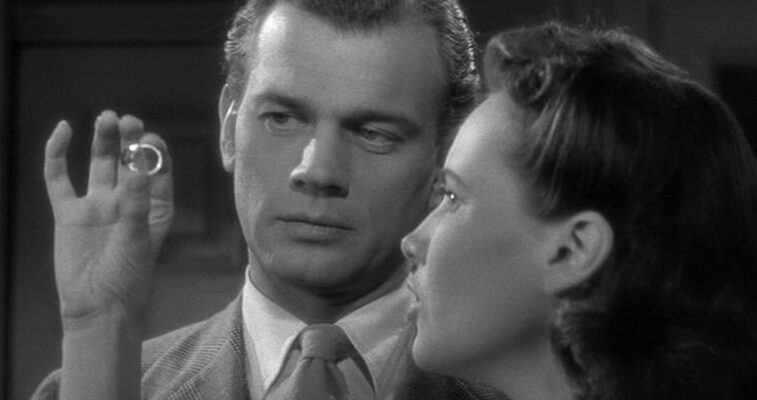[8]
Teresa Wright (Mrs. Miniver) plays a bored teenager who’s over-joyed when her favorite Uncle (The Third Man‘s Joseph Cotton) comes to stay with her family. But the warmth of family reunion soon gives way to cold suspicion when Cotton starts hiding things from her. Could he be the infamous ‘Merry Widow’ murderer?
Alfred Hitchcock said Shadow of a Doubt was his favorite film he directed. It may not have the star power of some of his later works, but that almost works in the film’s favor, helping to create the backdrop of an idyllic American every-town where no one locks their doors and everyone knows your name. Neither the town nor the family are prepared for Cotton’s dangerous killer-on-the-run character. The screenplay, co-authored by Our Town‘s Thornton Wilder, pits niece against uncle in a back-and-forth power struggle. She demands he leave town in exchange for keeping his secret, but after Wright suffers a couple of curious accidents, she knows her uncle aims to stay — and will kill her if she stands in his way. A couple of detectives are on Cotton’s case, but they don’t steal much thunder from our young heroine. She stands toe to toe with this villain, protecting her family from disturbing truths, all the way up to a violent showdown aboard a speeding train.
In many ways, Shadow of a Doubt is quintessential Hitchcock. It’s quick-paced, sprinkled with scenes of suspense, and elegant in its execution. The repeated use of ‘The Merry Widow Waltz’ is particularly interesting, often juxtaposed against dancers waltzing in circles — a novel way of depicting family nostalgia. The director’s delightfully dark sense of humor is also in the mix, showcased in a handful of scenes between Wright’s father (Henry Travers) and a family friend (Hume Cronyn) as they discuss — only theoretically — how they could successfully murder each other. As much as the film fits into the director’s oeuvre, it also stands out. No other Hitchcock film contains such an intimate portrait of family, and only Psycho goes as far in creating any empathy for the devil.
The cast is serviceable, with Wright better suited for the last half of her character arc than the first. Cotton has great moments, especially when he speaks contemptuously about how frivolously rich widows spend their husbands fortunes. But Patricia Collinge gives the most effective performance as Wright’s fragile-minded mother. With Macdonald Carey, Wallace Ford, and a great score from Dimitri Tiomkin.
Oscar Nomination: Best Original Story

